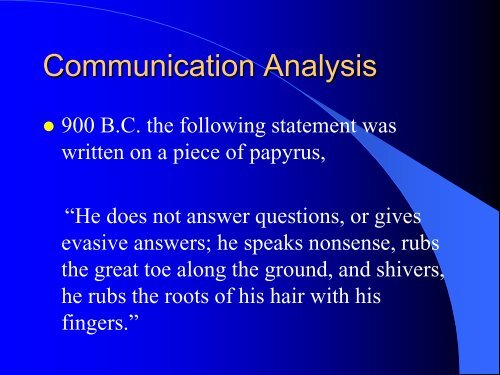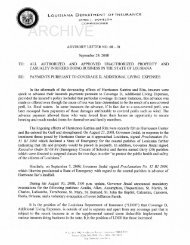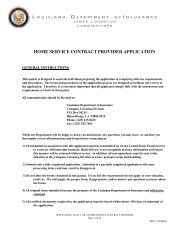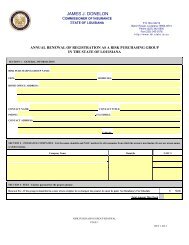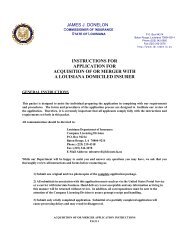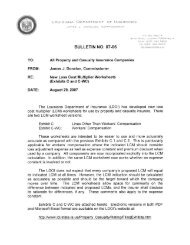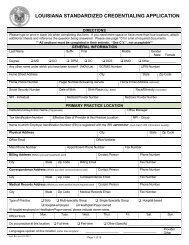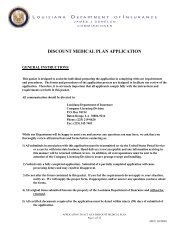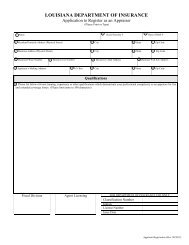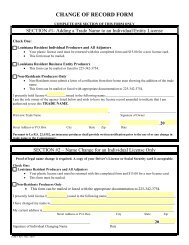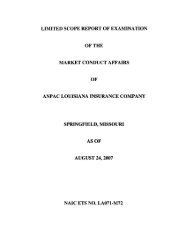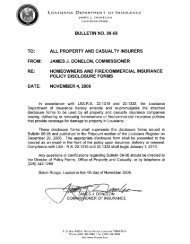Communication Analysis
Communication Analysis
Communication Analysis
Create successful ePaper yourself
Turn your PDF publications into a flip-book with our unique Google optimized e-Paper software.
<strong>Communication</strong> <strong>Analysis</strong><br />
• 900 B.C. the following statement was<br />
written on a piece of papyrus,<br />
“He does not answer questions, or gives<br />
evasive answers; he speaks nonsense, rubs<br />
the great toe along the ground, and shivers,<br />
he rubs the roots of his hair with his<br />
fingers.”
<strong>Communication</strong> <strong>Analysis</strong><br />
• Get rid of any prejudices - a good<br />
interviewer has none<br />
• Understand and Appreciate Cultural<br />
Differences
<strong>Communication</strong> <strong>Analysis</strong><br />
• Judge the Information not the Individual<br />
Providing the Information
<strong>Communication</strong> <strong>Analysis</strong><br />
• Individuals Process Information by Three<br />
Methods<br />
– Feeling . . . .Empirical<br />
– Hearing . . . Auditory<br />
– Visual . . . . The Sense of Seeing
<strong>Communication</strong> <strong>Analysis</strong><br />
• Visual Processor<br />
– When answering a question will look up and<br />
“See” the answer before speaking<br />
– They use high (above shoulder) quick hand<br />
movements/gesturing<br />
– They use action verbs that express “seeing”<br />
– 60% of population are visual processors
<strong>Communication</strong> <strong>Analysis</strong><br />
• Hearing Processors<br />
– When answering questions their eyes go side to<br />
side, as if looking for the answer on one side or<br />
the other<br />
– Their hand movements and gestures are below<br />
the shoulders<br />
– They use action verbs that express “sound”<br />
– 20% of population are auditory processors
<strong>Communication</strong> <strong>Analysis</strong><br />
• Feeling Processors<br />
– When asked a question their eyes go down, as if<br />
looking for an answer on the ground<br />
– They use low hand movements, usually small<br />
gestures with the hands remaining in their laps<br />
– They use action verbs that express “feeling and<br />
understanding”
<strong>Communication</strong> <strong>Analysis</strong><br />
• Feeling Processors are involved in taste and<br />
smell to a greater degree than Auditory and<br />
Visual processors<br />
• 15% of population are Feeling Processors
<strong>Communication</strong> <strong>Analysis</strong><br />
General Observations<br />
During an interview, a person trying to be<br />
deceptive will not only have to hide or<br />
change the crucial details they are<br />
protecting. They will also have to change<br />
the other facts of the circumstance to fit<br />
their version. This can leave<br />
inconsistencies between allegations, or<br />
holes and breaks in the narrative.
<strong>Communication</strong> <strong>Analysis</strong><br />
General Observations<br />
Most people do not attempt to deceive [lie]<br />
directly, but will become elusive, omit<br />
crucial facts, pretend forgetfulness, and<br />
pretend ignorance.
<strong>Communication</strong> <strong>Analysis</strong><br />
General Observations<br />
A truthful person will respond to their<br />
version of the event from memory, while a<br />
deceptive person will be reacting from their<br />
own imagination.
<strong>Communication</strong> <strong>Analysis</strong><br />
General Observations<br />
Deceptive people tend to edit or misplace<br />
emotion in recounting an event. But<br />
someone who is telling the truth will show<br />
emotion where it would be expected.
<strong>Communication</strong> <strong>Analysis</strong><br />
General Observations<br />
Someone telling a story that is not true will<br />
show logical or rational thinking. Someone<br />
relating a true story might not be thinking<br />
rationally at the time of the event and their<br />
story will show illogical acts or thoughts.
<strong>Communication</strong> <strong>Analysis</strong><br />
General Observations<br />
Usually people do not lie outright. They just<br />
do not concede to doing the misdeed.
<strong>Communication</strong> <strong>Analysis</strong><br />
General Observations<br />
A truthful person’s statement reads like a<br />
book. It has a beginning consisting of<br />
minor facts or details, a middle with major<br />
facts, and a ending of minor facts or details.
<strong>Communication</strong> <strong>Analysis</strong><br />
General Observations<br />
A deceptive person’s statement usually<br />
begins with major facts, e.g., alibi, has<br />
minor facts in the middle, and ends with<br />
major facts, as in “finish with a bang.”
<strong>Communication</strong> <strong>Analysis</strong><br />
General Observations<br />
In a deceptive statement, you often find the<br />
truth in what is not said, rather than what is<br />
said.
<strong>Communication</strong> <strong>Analysis</strong><br />
<strong>Communication</strong> <strong>Analysis</strong>, the subject of this<br />
session is presented as an art, not a science.<br />
And while we will cover a great deal of<br />
information today, there remains a great<br />
deal of information we will not discussed
<strong>Communication</strong> <strong>Analysis</strong><br />
• You must identify the “normal answering<br />
and speech pattern”<br />
• Observe deviation from this norm
<strong>Communication</strong> <strong>Analysis</strong><br />
Parts of Speech<br />
• To analyze communications, examine the<br />
communicator’s parts of speech<br />
– Pronouns<br />
– Verbs<br />
– Nouns<br />
• Part of the “norming” will include establishing the<br />
interviewee’s use of pronouns, nouns, and verbs. If<br />
a deviation from this norm occurs, asked yourself<br />
“why?”
<strong>Communication</strong> <strong>Analysis</strong><br />
Pronouns<br />
• Responsibility and Possession<br />
• Take the place of nouns<br />
• Personal Pronouns<br />
– I Me You He She We They<br />
• Possessive Pronouns<br />
– My Our Your His Her
<strong>Communication</strong> <strong>Analysis</strong><br />
Pronouns<br />
• A change in the use of pronouns is<br />
significant<br />
• When a change occurs the statement is<br />
devoid of personal involvement
<strong>Communication</strong> <strong>Analysis</strong><br />
Pronouns<br />
“I got up at 6:00 a.m. I took a bath and I<br />
shaved. I decided to go out and get some<br />
coffee. I went to Hardee’s on the corner<br />
near my house. Met a lady who lives in the<br />
area. Talked with her for a few minutes. I<br />
finished drinking my coffee and I drove<br />
onto work.”
<strong>Communication</strong> <strong>Analysis</strong><br />
Pronouns<br />
• I Vs. We<br />
• Lack of “I”<br />
• Overuse of “We”
• “We”<br />
<strong>Communication</strong> <strong>Analysis</strong><br />
Pronouns<br />
• Short for one’s self and others [after proper<br />
introductions]<br />
• Denotes togetherness<br />
• Indicates a relationship between persons
<strong>Communication</strong> <strong>Analysis</strong><br />
Pronouns<br />
• Omission of “We” is significant<br />
– Vs.<br />
• “My wife and I were invited to a birthday party. We<br />
arrived at the party a little late. The party was still<br />
in full swing when we left for home.”<br />
• “My wife and I were invited to a birthday party. My<br />
wife and I arrived at the party a little late. The party<br />
was in full swing when my wife and I left for<br />
home.”
<strong>Communication</strong> <strong>Analysis</strong><br />
Pronouns<br />
• A shift from “We” to “They”<br />
– reveals personal involvement<br />
• A person guilty of insurance fraud will find it<br />
difficult to keep “we” out of statement completely.<br />
• A rape victim will not use the pronoun “we” unless<br />
they know their assailant<br />
• Abduction victims do not use the pronoun “we”
<strong>Communication</strong> <strong>Analysis</strong><br />
Possessive Pronouns<br />
• Our, Your, His, Her, and Their reveal<br />
attachment<br />
• Changing the Possessive Pronoun or<br />
Dropping it Complete<br />
– Interviewee does not want to show possession<br />
or admit association<br />
• “I was cleaning my gun. I was putting my gun<br />
away. The gun went off.”
<strong>Communication</strong> <strong>Analysis</strong><br />
Nouns<br />
• Denote Persons. Places, and Things<br />
• Watch for sudden shifts from Pronouns to<br />
Individual’s names [nouns]<br />
• Watch for sudden shifts from husband,<br />
wife, partner, to the Individual’s Name
<strong>Communication</strong> <strong>Analysis</strong><br />
Verbs<br />
• Verbs express Action What, When, Where,<br />
How<br />
• Verbs express either the Past, Present, or<br />
Future
<strong>Communication</strong> <strong>Analysis</strong><br />
Verb Tense<br />
• 0n truthful statements, the use of the past<br />
tense is the norm<br />
• A shift in Tense could indicate deception
<strong>Communication</strong> <strong>Analysis</strong><br />
Verb Tense<br />
– “It happened last night. I went out on my back<br />
porch. It was almost dark. A man ran out of<br />
the bushes. He came onto the porch knocked<br />
me down and took my watch.”<br />
• Vs<br />
– “It happened last night. I went out on my back<br />
porch. It was almost dark. A man runs out of<br />
the bushes. He comes onto the porch, knocks<br />
me down and takes my watch.”
<strong>Communication</strong> <strong>Analysis</strong><br />
Extra/Non-Essential<br />
Information<br />
Any information given that does not answer<br />
or clarify the answer is extraneous or nonessential<br />
information.
<strong>Communication</strong> <strong>Analysis</strong><br />
Extra/Non-Essential<br />
Information<br />
A truthful person with nothing to hide, when<br />
asked, “What happened,“ will recount the<br />
events chronologically and concisely. They<br />
will answer the question in a straight<br />
forward manner.
<strong>Communication</strong> <strong>Analysis</strong><br />
Extra/Non-Essential<br />
Information<br />
Individuals involved in activities they wish<br />
to conceal usually feel the need to justify<br />
their actions. The information they relate<br />
will not flow in a logical time frame. They<br />
may skip around or skirt what really<br />
happened.
<strong>Communication</strong> <strong>Analysis</strong><br />
“Feigning and Hedging”<br />
• A Lack of Conviction<br />
• The Artful Dodger<br />
Note individuals who feigns a loss of<br />
memory or hedges the answer by using<br />
“qualifiers”
<strong>Communication</strong> <strong>Analysis</strong><br />
Qualifiers<br />
• I Don’t Remember<br />
• I Can’t Recall<br />
• I Believe<br />
• To the Best of My Knowledge
<strong>Communication</strong> <strong>Analysis</strong><br />
Qualifiers<br />
• Honest<br />
• Frankly<br />
• Usually<br />
• Generally<br />
• To Tell You the Truth
<strong>Communication</strong> <strong>Analysis</strong><br />
Qualifiers<br />
A person cannot say they “can’t remember”<br />
when answering an “open-ended” question,<br />
unless they do remember the item/event.<br />
Otherwise, it would be left out entirely.
<strong>Communication</strong> <strong>Analysis</strong><br />
Bridging Phrases<br />
• Sometime Later<br />
• Later On<br />
• Eventually<br />
• After-A-While<br />
• Meanwhile
<strong>Communication</strong> <strong>Analysis</strong><br />
• Note when a person begins to answer before<br />
the interviewer completes the question.
<strong>Communication</strong> <strong>Analysis</strong><br />
• Note slurring, stuttering, skipping around<br />
sentences, dropping sentences, restating in<br />
the middle of sentences, leaving off the<br />
ends of sentences and stammering<br />
• The Porky Pig Syndrome
<strong>Communication</strong> <strong>Analysis</strong><br />
• Note where an individual brings religion<br />
into the statement for the first time.
<strong>Communication</strong> <strong>Analysis</strong><br />
• Analyze “Open-Ended” questions by<br />
asking:<br />
– Why did the person say it?<br />
– Why did the person say it this way?<br />
– Why did the person say it at this specific<br />
location in the statement?<br />
– why did the person use this specific amount of<br />
time to answer this question?
<strong>Communication</strong> <strong>Analysis</strong><br />
• Analyze “Closed” question by noting:<br />
– Use of Qualifiers<br />
– Use of Bridging Phrases<br />
– The Porky Pig Syndrome<br />
– Answering Question with Questions
Summary<br />
• Statements, Interviews, and conversations<br />
contain a wealth of information far beyond<br />
what some individuals intend to<br />
communicate. <strong>Communication</strong> <strong>Analysis</strong><br />
provides a method of unlocking or<br />
identifying the true facts.


